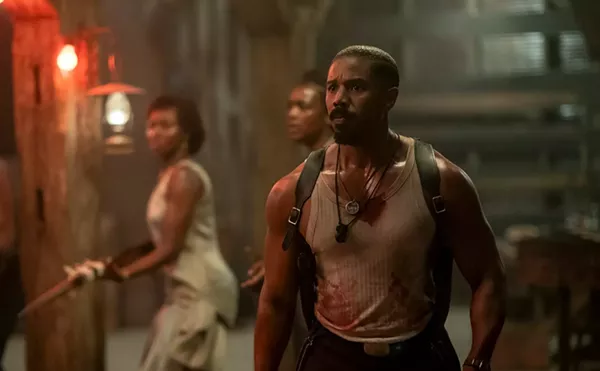
Audio By Carbonatix
[
{
"name": "GPT - Leaderboard - Inline - Content",
"component": "35519556",
"insertPoint": "5th",
"startingPoint": "3",
"requiredCountToDisplay": "3",
"maxInsertions": 100,
"adList": [
{
"adPreset": "LeaderboardInline"
}
]
}
]
Tommy Lee Jones has what used to affectionately be called a "mug." Unlike the prepubescent complexions and chiseled jaws of most modern movie stars, his pocked and weathered face is engraved with history and character. His gruff charisma evokes the personae of Lee Marvin, Richard Farnsworth or a middle-aged Steve McQueen. But in the last few years, Jones has been treading water as an actor, appearing in one lackluster Hollywood vehicle after another — culminating in the highly embarrassing cheerleader romp, Man of the House.
Thus, it makes perfect sense for the 59-year-old actor to jump behind the camera in order to redirect his stalled career. What's surprising is how sure-footed his directorial debut is.
With a script by Guillermo Arriaga (21 Grams), the film presents a stoic and evocative contemporary Western that pleads for racial tolerance — while allowing Jones to let his inner crackpot run wild. In a contemporary Texas border town, the body of illegal immigrant Melquiades Estrada is discovered in a shallow grave. When the sheriff (country crooner Dwight Yoakam) balks at solving the murder, tough-as-nails Pete Perkins (Jones) takes matters into his own hands. A close friend of Melquiades, Perkins promised to bury him in his Mexican hometown should anything happen. When Pete discovers that border patrolman Mike Norton (Barry Pepper) was responsible for the shooting, he kidnaps the officer and forces him to dig up his friend's body and carry it across the border on horseback.
Comparisons to Sam Peckinpah's Bring Me the Head of Alfredo Garcia will be inevitable; but instead of an anti-establishment tirade, Jones delivers a tale of atonement, loyalty and forgiveness. The first half of his film is nonlinear, piecing together details of Melquiades' accidental death, his friendship with Pete and the daily tensions of living in such a beautifully godforsaken community. The second half settles down and presents Mike and Pete's transformational journey to Mexico in a more orderly fashion.
At times, the film feels overly padded with barely resolved subplots and unnecessary flashbacks. But occasionally a specific reminiscence will carry unexpected poignancy. Sitting in his Jeep, waiting for his wife at the mall, Mike unexpectedly flashes back to Melquiades' leaking wound and breaks down in tears. It's an honest portrayal of how shame and regret can blindside us in our dullest moments.
Jones carefully walks the line between Pete's repression and raw insanity, etching a complex portrait of a broken man. Barry Pepper, with his sharp ratlike features, is perfect as the vicious bully who slowly discovers his humanity. It's a patient and moving performance that earns every ounce of our sympathy.
The film runs a bit long for its premise and some of Jones' choices undermine things. Instead of naturally building our ambivalence toward Jones' hero and Pepper's villain, the script tips its hand too deliberately and without finesse. Interludes between Pete and his rotting friend suggest we've crossed into Norman Bates territory.
Still, Three Burials struggles to affirm the value of human life. Equal parts sweetness and violence, bleakness and humor, Jones's evocative journey into the soul of a very hard land shows us that, good or evil, no man is irredeemable — or above reproach.
Showing at the Main Art Theatre (118 N. Main St., Royal Oak; 248-263-2111).
Jeff Meyers writes about film for Metro Times. Send comments to letters@metrotimes.com.





